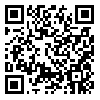Volume 5, Issue 3 (12-2022)
2022, 5(3): 0-0 |
Back to browse issues page
Download citation:
BibTeX | RIS | EndNote | Medlars | ProCite | Reference Manager | RefWorks
Send citation to:



BibTeX | RIS | EndNote | Medlars | ProCite | Reference Manager | RefWorks
Send citation to:
Mirzaei A, Pouresmaeili F, jalilian M. The effectiveness of educational intervention based on Health Belief Model on mothers behaviors about complementary feeding of 6-18 months infants. Journal title 2022; 5 (3)
URL: http://newresearch.medilam.ac.ir/article-1-2062-en.html
URL: http://newresearch.medilam.ac.ir/article-1-2062-en.html
Ilam medical university
Abstract: (1868 Views)
Background and aim: Complementary feeding (CF) plays a key role in the development and prevention of malnutrition in infants under two years of age. The purpose of this study was to determine the effectiveness of educational intervention based on Health Belief Model (HBM) on mothers' behavior on CF of 6-18 months old infants in Andimeshk.
Materials and methods: The present study was conducted in two stages. In the first stage, a descriptive study was conducted with 270 mothers with 6-18 month old infants referred to six health centers that were selected randomly and included in the study. The results of the descriptive study were analyzed for the needs assessment of educational intervention. In the second stage, based on the results of the descriptive study, appropriate educational intervention was designed and implemented. Educational intervention was conducted in two intervention (n=32) and control (n=35) groups for three weeks. Data were collected by a 53-item questionnaire in two stages before and one month after the intervention and were analyzed using SPSS software and descriptive statistics, Pearson correlation, multiple linear regression, one-way ANOVA, chi-square, independent samples t-test and paired samples t-test.
Materials and methods: The present study was conducted in two stages. In the first stage, a descriptive study was conducted with 270 mothers with 6-18 month old infants referred to six health centers that were selected randomly and included in the study. The results of the descriptive study were analyzed for the needs assessment of educational intervention. In the second stage, based on the results of the descriptive study, appropriate educational intervention was designed and implemented. Educational intervention was conducted in two intervention (n=32) and control (n=35) groups for three weeks. Data were collected by a 53-item questionnaire in two stages before and one month after the intervention and were analyzed using SPSS software and descriptive statistics, Pearson correlation, multiple linear regression, one-way ANOVA, chi-square, independent samples t-test and paired samples t-test.
Received: 2015/08/30 | Accepted: 2015/11/8 | Published: 2022/12/31
Send email to the proposal executer
| Rights and permissions | |
 | This work is licensed under a Creative Commons Attribution-NonCommercial 4.0 International License. |






